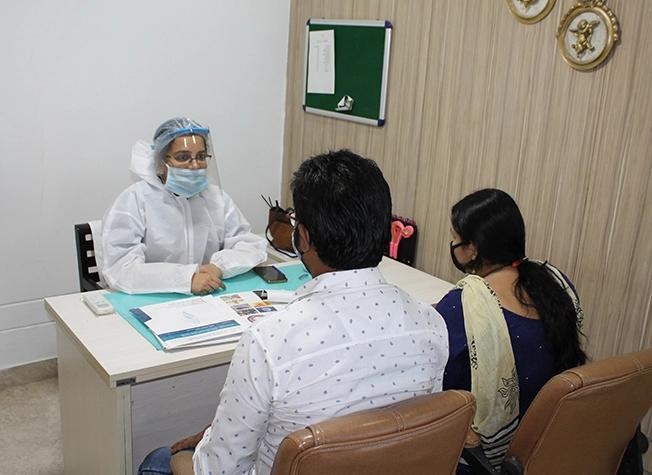
Easy Monthly Installment
@ Just ₹4,611/-*
Per Month

Cryopreservation is a technique that involves the freezing of biological material, tissues, or cells at extremely cold temperatures so that the biological activities taking place in a cell entirely stops. The temperature used in the cryopreservation method is -196 °C or -321 °F, and the tissues or cells are stored in liquid nitrogen gas in specialized containers.
"Methods of cryopreservation are slow freezing and fast or vitrification freezing. Vitrification involves the conversion of tissue or cell into solid without forming any ice and is done by adding a cryoprotectant that protects the cells from damage."
This process helps to freeze and thaw the sperms, egg, or embryo that can be used further in the IVF process. Sperms are used for the Intrauterine insemination process. The embryos of females are frozen and used during IVF treatment and used later if the process of IVF fails.
In this process, medications are used that stimulate the ovaries to produce multiple eggs. Then transvaginal ultrasound helps to locate follicles, and a needle is inserted to remove eggs from follicles. Then 12-16 eggs are retrieved per cycle. Then the retrieved eggs are harvested and cooled to zero temperature for future use. Then vitrification is performed for freezing egg rapidly, and cryoprotectants are also added to prevent the formation of ice crystals. Quick freezing helps reduce the risk of damage to the egg cells and ensures a higher rate of survival of oocytes.
This helps to preserve embryos for preserving fertility for future use. In this treatment, the females are given medication that induces the release of multiple eggs. The eggs are allowed to fertilize with the sperm of the partner. They are either stored with slow freezing or rapid freezing methods.
This treatment helps store sperm for future use. It is an ideal option for males who is about to have infertility due to testicular surgery, chemotherapy, or prostate surgery. Sperm freezing is for males who are about to have a vasectomy, low sperm count, or for those whose sperm quality is deteriorating. In the process, the semen is cooled in a sterile dish and then analyzed for sperm count, motility, volume, and other factors. Cryoprotectants are added to prevent the formation of ice crystals and stored by slow or rapid freezing techniques.
Cryopreservation is a technique that involves the freezing of biological material, tissues, or cells at extremely cold temperatures so that the biological activities taking place in a cell entirely stops. The temperature used in the cryopreservation method is -196 °C or -321 °F, and the tissues or cells are stored in liquid nitrogen gas in specialized containers.
"Methods of cryopreservation are slow freezing and fast or vitrification freezing. Vitrification involves the conversion of tissue or cell into solid without forming any ice and is done by adding a cryoprotectant that protects the cells from damage."
This process helps to freeze and thaw the sperms, egg, or embryo that can be used further in the IVF process. Sperms are used for the Intrauterine insemination process. The embryos of females are frozen and used during IVF treatment and used later if the process of IVF fails.
In this process, medications are used that stimulate the ovaries to produce multiple eggs. Then transvaginal ultrasound helps to locate follicles, and a needle is inserted to remove eggs from follicles. Then 12-16 eggs are retrieved per cycle. Then the retrieved eggs are harvested and cooled to zero temperature for future use. Then vitrification is performed for freezing egg rapidly, and cryoprotectants are also added to prevent the formation of ice crystals. Quick freezing helps reduce the risk of damage to the egg cells and ensures a higher rate of survival of oocytes.
This helps to preserve embryos for preserving fertility for future use. In this treatment, the females are given medication that induces the release of multiple eggs. The eggs are allowed to fertilize with the sperm of the partner. They are either stored with slow freezing or rapid freezing methods.
This treatment helps store sperm for future use. It is an ideal option for males who is about to have infertility due to testicular surgery, chemotherapy, or prostate surgery. Sperm freezing is for males who are about to have a vasectomy, low sperm count, or for those whose sperm quality is deteriorating. In the process, the semen is cooled in a sterile dish and then analyzed for sperm count, motility, volume, and other factors. Cryoprotectants are added to prevent the formation of ice crystals and stored by slow or rapid freezing techniques.
In vitro fertilization (IVF) is a common assisted reproductive technology used to help couples or individuals conceive when natural conception is challenging or impossible. The IVF procedures involve multiple steps- Ovarian Stimulation, Egg Retrieval, Sperm Collection, Fertilization, Embryo Culture, Embryo Transfer, Luteal Phase Support, Pregnancy Test & Embryo Cryopreservation. IVF has offered hope to many individuals and couples facing fertility challenges and has resulted in the birth of numerous healthy babies at our IVF Clinic in Delhi.
Are you struggling with infertility and not being able to conceive for a long time? Don't worry! Experience the joy of parenthood with IVF at World Infertility & IVF Centre, Delhi, India.
Our Empanelment
Neelkanth Hospital is a leading super multi-speciality hospital, nestled in Gurgaon. With 70+ years of legacy in healthcare, 42+ years of experience in the specialised field of infertility treatments, we provide modern medicine and medical procedures with the latest technology.
IVF Success Stories
What our patients say about us

We are delighted to announce that our doors are open, and we are now accepting appointments to serve you better.